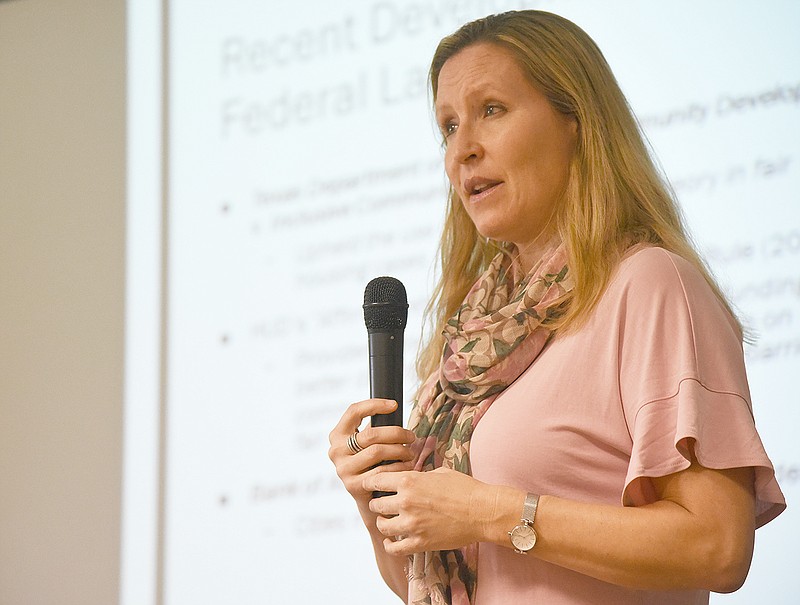Several local entities paired up Monday to celebrate the 50th anniversary of the Fair Housing Act and educate the public.
About 20 people attended the annual Fair Housing Conference, put on by the Jefferson City, the Jefferson City Area Board of Realtors, Missouri Commission on Human Rights and River City Habitat for Humanity to commemorate the 50th anniversary of the Fair Housing Act of 1968.
The Fair Housing Act bans discrimination based on race, color, disability, religion, sex, familial status or national origin when renting or selling a living space. Landlords also can't advertise a building or an apartment indicating a preference or discriminating against potential tenants.
"Fair housing to me means equal housing opportunities for everyone," Jefferson City Neighborhood Services Manager Jayme Abbott said. "It's not about just rental, it's not about Section 8, it's not about Housing Authority. It's about being able to live where you want to live without being discriminated against."
Abbott said they host the conference to educate landlords and tenants of their rights and of the resources there are when housing discrimination does occur.
"Discrimination can be very subtle so the education is key and getting the information out there so everyone can become self-aware as to if they're renting out properties in accordance to the law, if realtors are showing properties in accordance to the law - they're not doing what's called redlining where they're guiding potential buyers to a certain neighborhood," she said. "It's just making sure everyone is educated so the community can be affected correctly by it."
They have been hosting the conference consistently since 2013 but had a couple of fair housing educational events prior to that. To tailor information each year, the sponsors reached out to realtors, landlords and tenants to see what they felt should be discussed at the Fair Housing Conference.
The conference featured four speakers and ranged in topics from what is categorized under the law to how different entities pursue housing discrimination cases.
Several also noted how housing discrimination cases have changed over the 50 years. While blatant discrimination still exists, speaker Tiana Alexander said, overt discrimination appears to be more common today.
"You don't see signs saying, 'No blacks allowed,' or redlining but discrimination still exists," said Alexander, the enforcement branch chief for the United States Department of Housing and Urban Development Office of Fair Housing and Equality Opportunity in Kansas City. "Discrimination has changed face but it's still there. You never know what people are experiencing just to have the right to choose where they live."
Jefferson City Historic Preservation Chair Mary Schantz sat in the back of the room, intently listening to the speakers. She said she has always been interested in fair housing as she used to work as a realtor and advocates for low-income and fair housing.
"It's been 50 years since the law changed and made it against the law to discriminate in housing and yet segregation really hasn't significantly changed and that's problematic," she said. "I think people need to understand that sometimes when you pass a law, you just think, 'OK, that problem is solved,' but we need to look around and understand that we still have very segregated communities. So, I think it's important people know more about the law, understand what's legal and what's not and also understand the subtle ways people are discriminated against in housing, employment and every other way."

